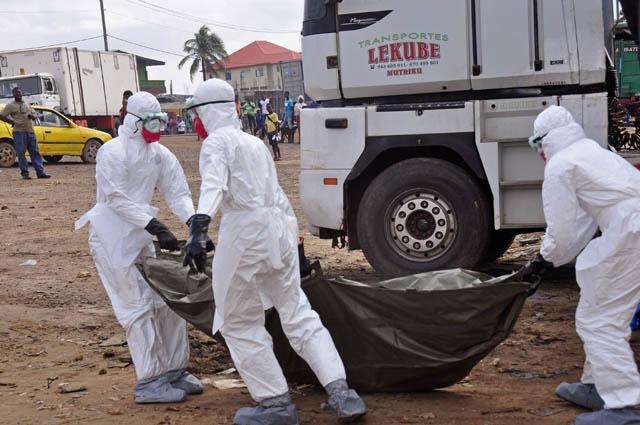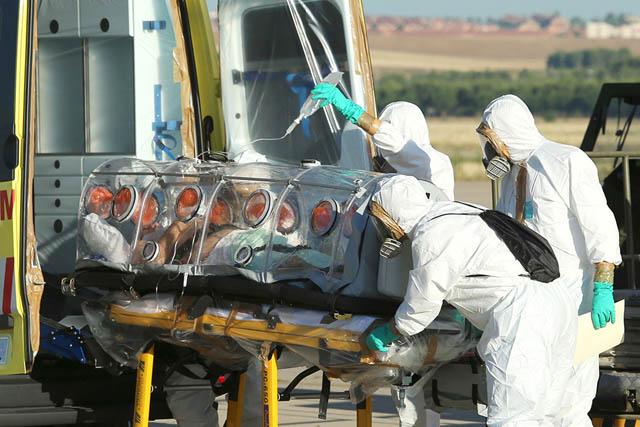You are here
As African medics die of Ebola, debate continues over drugs
By AP - Aug 13,2014 - Last updated at Aug 13,2014

DAKAR, Senegal — Doctors treating a leading Sierra Leone physician who became sick with Ebola considered giving him an experimental drug but feared it could trigger a dangerous immune response and did not administer it, Doctors Without Borders said Wednesday.
The revelation came the same day that another top doctor from Sierra Leone died of the disease, fuelling a debate about how to apportion a limited supply of untested drugs and vaccines and whether they are even effective. Modupeh Cole was one of the top doctors working in the Ebola isolation ward in Connaught Hospital in Freetown, Sierra Leone’s capital.
Ebola has killed more than 1,000 people and sickened nearly 2,000 in the current West African outbreak that has also hit Guinea, Liberia and Nigeria. Many of the dead are health workers, who are often working with inadequate supplies and protection.
At the time the experimental treatment was being considered for Dr Sheik Humarr Khan, his immune system was already starting to produce antibodies suggesting he might recover, Doctors Without Borders, also known by its French acronym, MSF, said in a statement Wednesday. Khan was also due to be transferred to a European hospital that would be more capable of handling any side effects that might arise with the experimental drug, it said.
In the end, the treating physicians decided against using the drug. They never told Khan of its existence because they felt it would be unethical to tell him of a treatment they might not use. Shortly after their decision, however, Khan’s condition worsened, the statement said, and the company providing the medical evacuation decided not to transfer him. He died a few days later, on July 29.
“Every day, doctors have to make choices, sometimes difficult, about treatment for their patients,” said the Doctors Without Borders statement. “Trying an untested drug on patients is a very difficult decision, particularly in the light of the ‘do no harm’ principle.”
The statement did not specify what drug was considered. But it is believed to be ZMapp, an experimental drug that has since been given to two Americans and a Spaniard.
The California-based company that makes the drug, Mapp Pharmaceuticals, has said that its supplies are now exhausted, and it will take months to make even a modest amount.
The drug has never been tested in humans, and it is not clear if it is effective or even harmful. The Americans are improving — although it is unclear what role ZMapp has played in that — but the Spaniard died Tuesday.
The last known doses of ZMapp were arriving Wednesday in Liberia, where the government has said they will be given to two doctors. They would be the first Africans known to receive the treatment.
But the debate over experimental treatments and vaccines will continue. Canada has promised to donate 800 to 1,000 doses of its untested Ebola vaccine to the World Health Organisation and already questions are being asked about who will get it and how scientists will determine if it works.
Dr Gregory Taylor, deputy head of the Public Health Agency of Canada, which developed the vaccines, said it makes the most sense to give the vaccine to healthcare workers in Africa who are among the most vulnerable because of their close contact with Ebola patients.
Guinea is considering asking for access to the vaccine, according to Communications Minister Al Houssein Makanera Kake.
Unlike ZMapp, which is being given to only a handful of people and is unlikely to yield significant information about the drug’s effectiveness, the vaccine could be tested in a small, but more rigorous field trial.
“It gives us an opportunity to test the vaccine in an outbreak situation in populations that are at risk,” said David Heymann, who headed the WHO’s response to SARS and is now professor at London School of Hygiene and Tropical Medicine. “However, the study design will be very difficult because you have to make sure the health workers don’t lapse in their infection control, and then you can’t ever be sure it was the vaccine that protected them.”
Related Articles
The World Health Organisation authorised the use of experimental drugs in the fight against Ebola on Tuesday as the death toll topped 1,000 and a Spanish priest became the first European to succumb to the latest outbreak of the virus.
As the world scrambles to stem the rapid spread of the killer Ebola virus, the World Health Organisation hosted a meeting on Monday to discuss the ethics of using experimental drugs.
Genetic studies of some of the earliest Ebola cases in Sierra Leone reveal more than 300 genetic changes in the virus as it leapt from person to person, changes that could blunt the effectiveness of diagnostic tests and experimental treatments now in development, researchers said on Thursday.

















